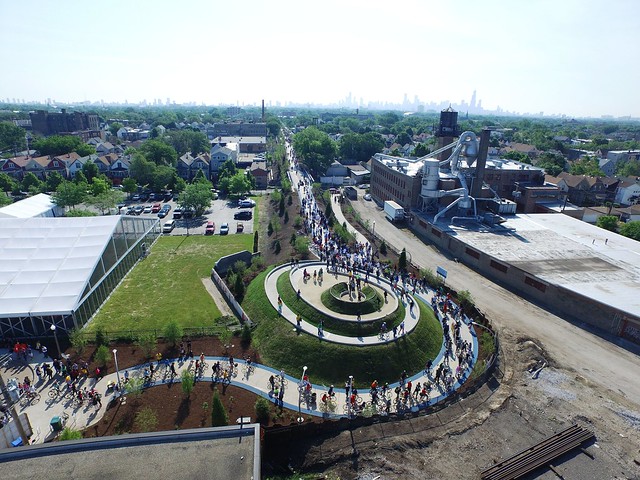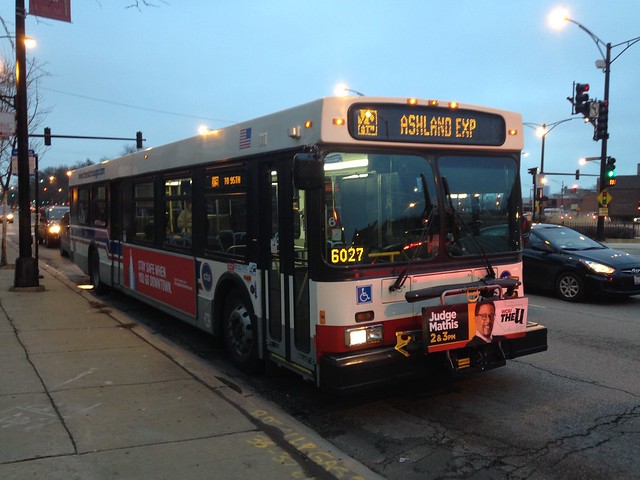[The Chicago Reader recently launched a new weekly transportation column written by Streetsblog Chicago editor John Greenfield. This partnership will allow Streetsblog to extend the reach of our livable streets advocacy. We’ll be syndicating a portion of the column on the day it comes out online; you can read the remainder on the Reader’s website or in print. The paper hits the streets on Thursdays.]
With multiple police abuse scandals and an impending potential teachers' strike, this has turned out to be a kidney stone of a year for Mayor Emanuel. But the silver lining of Rahm's reign has always been smart transportation policies, and our city racked up a remarkable number of wins in that department in 2015. Let's take a look back at some of the key local walking, biking, transit, and public space stories of the past 12 months, in roughly chronological order.
In February, the CTA opened the futuristic, totally tubular Cermak-McCormick Place station, filling in a gap of about 2.5 miles between the Green Line's Roosevelt and 35th-Bronzeville-IIT stops, which has existed since 1977. Highlights of the new $50 million facility include a steel-and-glass canopy that provides plenty of natural light and weather protection, three entrances, and full wheelchair accessibility.
In May, Emanuel cut the ribbon on the $100 million Chicago Riverwalk extension, one of several marquee public space projects launched over the last four years. Areas dubbed "The Marina," "The Cove," and "The River Theater" opened, featuring sleek design and bustling drinking and dining venues, and new boat and bike rental franchises. Workers are currently constructing the next few sections, and the project will eventually create a car-free walking and biking route all the way from Lake Street and Wacker to Lake Michigan.
But the highest-profile public space opening this year was the long-awaited Bloomingdale Trail, re-christened the 606, which debuted on—wait for it—6/06. The $95 million trail has proved wildly popular, attracting an economically and ethnically diverse crowd of strollers, joggers, cyclists, and skaters. Hopefully the user demographic will stay diverse, but developers are now rushing to build fancy housing on nearby land parcels. On the same day the 606 opened, a new section of the Cal-Sag Trail, a 26-mile path planned along the Calumet River, opened in the south suburbs.
This spring, the Chicago Department of Transportation expanded the Divvy bike-share system from 300 stations and 3,000 bicycles to 476 stations and 4,760 bikes. The coverage zone grew from 19 percent of the city's geographic area to more than 38 percent, making our network the largest in North America based on number of stations and coverage area, although New York and Montreal's systems still have more bikes. Next spring, Divvy is scheduled to add 70 more stations, expanding coverage to new areas on the west side, plus Oak Park and Evanston.
In July the city rolled out the Divvy for Everyone equity program, with the goal of addressing the system's lopsided membership demographics. Surveys found that, as with most bike-share systems around the country, Divvy members have been largely white, male, young, affluent, and well educated. The D4E initiative offers one-time $5 annual memberships to low-income Chicagoans, and waives the usual credit card requirement. As of early December, more than 1,100 residents had signed up.
One positive aspect of the otherwise disastrous Bruce Rauner administration is that the governor has withdrawn support for the Illiana Tollway, a pet project of his predecessor Pat Quinn. This highway boondoggle, slated for an area just south of the metro region, would have destroyed farmland and induced sprawl, as well as putting taxpayers on the hook for $500 million in borrowing. In early June, the governor ordered the Illinois Department of Transportation to freeze all contracts and procurements for the tollway and remove it from IDOT's multiyear transportation plan.
In late July, the agency that runs the South Shore Line commuter rail route between Chicago and South Bend, Indiana, finally agreed to test a bikes-on-board program after dragging its feet on the issue for years. Their decision was influenced by the Active Transportation Alliance sarcastically awarding them a Broken Spoke Award as the only commuter rail system in the country that doesn't allow bikes. The pilot begins next spring.






